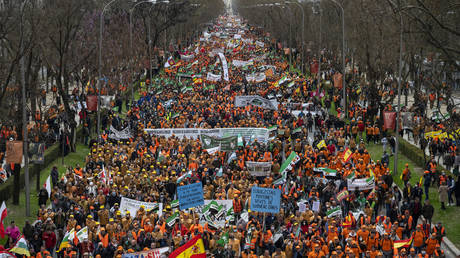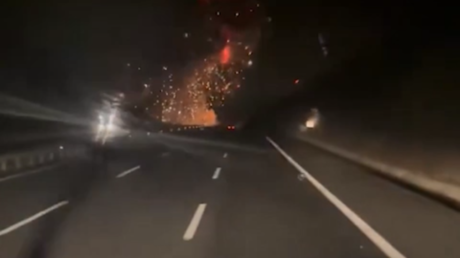
Another wave of demonstrations hit Madrid as costs continue to rise amid the Russia-Ukraine conflict
Thousands of farmers and hunters marched through Madrid on Sunday in a mass demonstration dubbed “20M Rural,” protesting against the government’s inability to curb rising prices amid the Russia-Ukraine conflict.
The agricultural workers, waiving Spanish flags and whistling, marched through the streets accompanied by tractors blowing their horns. The demonstrators were protesting against rising prices on fuel, energy and food, and called on the government to help the sector, to stop speculation, and adopt new laws to regulate supply chains.
“The countryside has come to say ‘Enough of the government pimping us and putting the food and work of many people at risk,’” said Pedro Barato, head of the agricultural employers’ association ASAJA, adding that if the protesters’ demands were not met, it would demonstrate the “irresponsibility” of Spanish Prime Minister Pedro Sanchez.
“Today is the start of looking for solutions… Enough is enough, let the head of government stop traveling and start acting,” he told journalists during the march.
Official sources estimated that 150,000 people attended the “20M Rural” mass protest in Madrid, which was organized and promoted by Alianza Rural, COAG, ASAJA and other agricultural worker’s unions. However, the organizers reported more than 400,000 people took part. The demonstration successfully concluded on Sunday afternoon without incident.
The mass protests were backed by leaders of opposition parties Vox, Partido Popular and Ciudadanos. Santiago Abascal, the president of the far-right Vox party, reportedly demanded the resignation of Prime Minister Pedro Sanchez.
A spokesman for Citizens in the Congress of Deputies, Edmundo Bal, hinted that the PM’s actions were insulting to agriculture workers.
“He treats us like idiots. And he wants us to believe that Putin is to blame for this situation,” he claimed, as quoted by the Spanish news outlet Vozpopuli.
The unprecedented economic sanctions were imposed on Russia by the international community in retaliation for the country’s attack on neighboring Ukraine in late February. The sanctions included such measures as asset freezes affecting an extended list of Russian officials and businessmen, as well as the closure of airspace over most European countries and curbs on exports and imports of certain goods, raw materials and energy sources. These sanctions have already had an impact on the global economy, as many countries are now experiencing rising prices on energy, gas and other commodities due to the disruption of supply chains.




